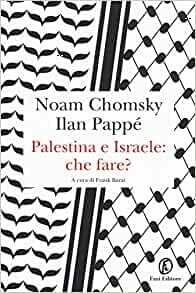Take a photo of a barcode or cover
informative
sad
fast-paced
informative
medium-paced
informative
reflective
medium-paced
challenging
informative
medium-paced
informative
informative
sad
fast-paced
On Palestine is an essential, thought-provoking read that challenges dominant narratives with clarity, moral conviction, and historical depth. Chomsky and Pappé bring together sharp analysis and deep humanity in the discussion of the ongoing "crisis" in Gaza.
Through a series of conversations followed by essays, the authors lay bare the systemic injustices faced by Palestinians and critique the frameworks of occupation, apartheid, and Western complicity. Chomsky in particular is scarhing in his indictment of U.S. foreign policy, while Pappé offers invaluable historical context grounded in his extensive research on the region and the origins of Zionism. Together, they offer not only a sobering diagnosis but also a passionate call for justice and accountability.
The book does not shy away from a direct and critical examination of Zionism as a political project. Pappé especially unpacks its colonial underpinnings, arguing that the establishment and expansion of the Israeli state have been predicated on the displacement and marginalization of the Palestinian people. Both authors contend that Zionism, in its current state-driven form, is incompatible with a just and democratic resolution to the conflict. Rather than a polemic, their critique is grounded in historical documentation, lived experience, and an ethical commitment to universal human rights.
I found On Palestine incredibly accessible without sacrificing depth: this book provides a crucial perspective that is too often marginalized in mainstream discourse.
Overall, a great foundational text for those looking to expand their understanding of the ongoing war crimes being committed in Gaza and the overwhelming international apathy towards it.
Through a series of conversations followed by essays, the authors lay bare the systemic injustices faced by Palestinians and critique the frameworks of occupation, apartheid, and Western complicity. Chomsky in particular is scarhing in his indictment of U.S. foreign policy, while Pappé offers invaluable historical context grounded in his extensive research on the region and the origins of Zionism. Together, they offer not only a sobering diagnosis but also a passionate call for justice and accountability.
The book does not shy away from a direct and critical examination of Zionism as a political project. Pappé especially unpacks its colonial underpinnings, arguing that the establishment and expansion of the Israeli state have been predicated on the displacement and marginalization of the Palestinian people. Both authors contend that Zionism, in its current state-driven form, is incompatible with a just and democratic resolution to the conflict. Rather than a polemic, their critique is grounded in historical documentation, lived experience, and an ethical commitment to universal human rights.
I found On Palestine incredibly accessible without sacrificing depth: this book provides a crucial perspective that is too often marginalized in mainstream discourse.
Overall, a great foundational text for those looking to expand their understanding of the ongoing war crimes being committed in Gaza and the overwhelming international apathy towards it.





